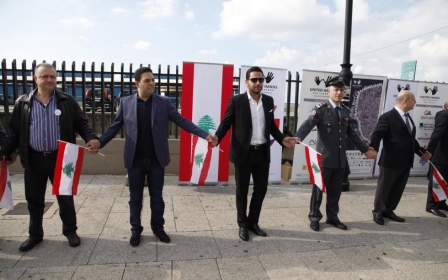Twisted morals in Lebanon

Earlier this year, the Lebanese Internal Security Forces (ISF) - the country’s primary police force - were the subject of a public relations campaign that inundated Lebanon’s thoroughfares with billboards depicting male and female uniformed ISF officers cradling babies. The images were accompanied by a pledge of devotion to the Lebanese populace.
Driving down the highway, one could not help but feel that there was something very wrong with this picture.
And indeed, a very different picture of the ISF emerges from a 2013 Human Rights Watch (HRW) report entitled “‘It’s part of the job’: Ill-treatment and torture of vulnerable groups in Lebanese police stations.”
The “it’s part of the job” bit is a direct quote from the head of a police station in Beirut, referring to the idea that “it’s normal for a police officer to slap a detainee around”. This analysis was incidentally issued in response to a complaint filed by an HRW researcher regarding harassment and intimidation that she had been subjected to by the ISF.
The report focuses on the particularly abhorrent treatment of persons detained for suspected “immoral” criminal activity such as drug use, sex work, or homosexual behaviour - for whom it appears torture, rape, and humiliation are simply par for the course. Detainees variously describe being beaten, doused with cold water, suspended from the ceiling in painful positions, chained to desks and other items, and having body parts broken.
Another common tactic is the denial of food, water and medicine. In the case of detained women, male police officers often threaten to further complicate their existence if sexual favours are not forthcoming.
Given the pervasive impunity surrounding ISF operating procedures, what we end up with, basically, is a system of “justice” in which being gay is a crime but torture is not.
Inside the “classy” cell
I received independent corroboration of the criminal conditions inside Lebanese police institutions from an acquaintance - we’ll call him “X” - who was recently detained by the ISF for three days. His crime? Carrying a piece of hash slightly over one gram, i.e. approximately one-gazillionth the amount that is regularly produced in Lebanon with official complicity.
X was delivered to the Hobeish police station down the street from the manicured campus of the exclusive American University of Beirut and put in a cell measuring less than three metres squared, which he shared with 13 other men. He described the logistics of sleep: “Six people sleep on one side, six people sleep on the other side, and two people sleep in the bathroom.”
According to X, however, this was in fact the “classy” cell into which folks would sometimes pay bribes to be transferred. Of course, the accommodations presumably lost their charm after 89 days - the length of internment thus far of one of the cellmates. Amenities included one small, dirty window and an overhead light that remained switched on at all times, prompting the detainees to joke that they’d finally found one place in electricity-stricken Lebanon where the power doesn’t get cut.
X spent his short stint at Hobeish alternately making up songs about the facility with his companions, hearing stories about a detainee who allegedly had a broomstick inserted into his anus, and witnessing the aftermath of torture episodes. He described seeing the dead body of a man in the cell next to him who had perished -officially from “liver failure” - shortly after an ISF interrogation session.
In another interrogatory instance, X said, an Egyptian detainee was whipped with cables and treated to a torture technique nicknamed after rotisserie chicken, which shares the same suspension concept.
This particular man had been hauled into Hobeish on account of his employment at a cannabis farm; the farm’s proprietor was let off the hook after forking out an attractive sum. X claimed that the Egyptian hadn’t even known what he was farming and had recently taken the job because it permitted him to work nights at a gas station and thus somewhat mitigate his destitution.
Lebanese “justice” strikes again.
Perverting morality
As X acknowledged, his own time at Hobeish was, relatively speaking, a “walk in the park”.
This had less to do with the “classiness” of his cell than the issue of class itself. Because his appearance denoted a certain socioeconomic status, he was treated with a degree of respect unavailable to impoverished inmates of maligned nationalities. Detained Egyptian and Syrian labourers were, X said, addressed as “dogs” and “sons of bitches” by prison personnel as well as other prisoners.
The overlap of classism and racism obviously isn’t unique to Lebanon, but the Lebanese elite have perfected the arrangement into a fine art. In this way, Hobeish can be seen as a microcosm of Lebanese society, where the unwritten rule is that human beings are far from equal before the “law” - itself a most flexible concept that exempts corrupt warlords-cum-politicians from judicial accountability.
As for ISF accountability, HRW notes that the extraction through torture and coercion of confessions that often turn out to be false is “particularly a problem with the Drug Repression Bureau and police units concerned with preserving morality”, i.e. those that enforce “‘morality-related’ laws against drug users, sex workers, and lesbian, gay, bisexual, and transgender (LGBT) people.”
Maybe it’s time for some real morals.
- Belen Fernandez is the author of The Imperial Messenger: Thomas Friedman at Work, published by Verso. She is a contributing editor at Jacobin magazine.
The views expressed in this article belong to the author and do not necessarily reflect the editorial policy of Middle East Eye.
Photo: Lebanese Internal Security Forces practice an assault during a drill of police intervention techniques at the entrance of Beirut International Airport on 19 April, 2013 (AFP)
New MEE newsletter: Jerusalem Dispatch
Sign up to get the latest insights and analysis on Israel-Palestine, alongside Turkey Unpacked and other MEE newsletters
Middle East Eye delivers independent and unrivalled coverage and analysis of the Middle East, North Africa and beyond. To learn more about republishing this content and the associated fees, please fill out this form. More about MEE can be found here.





